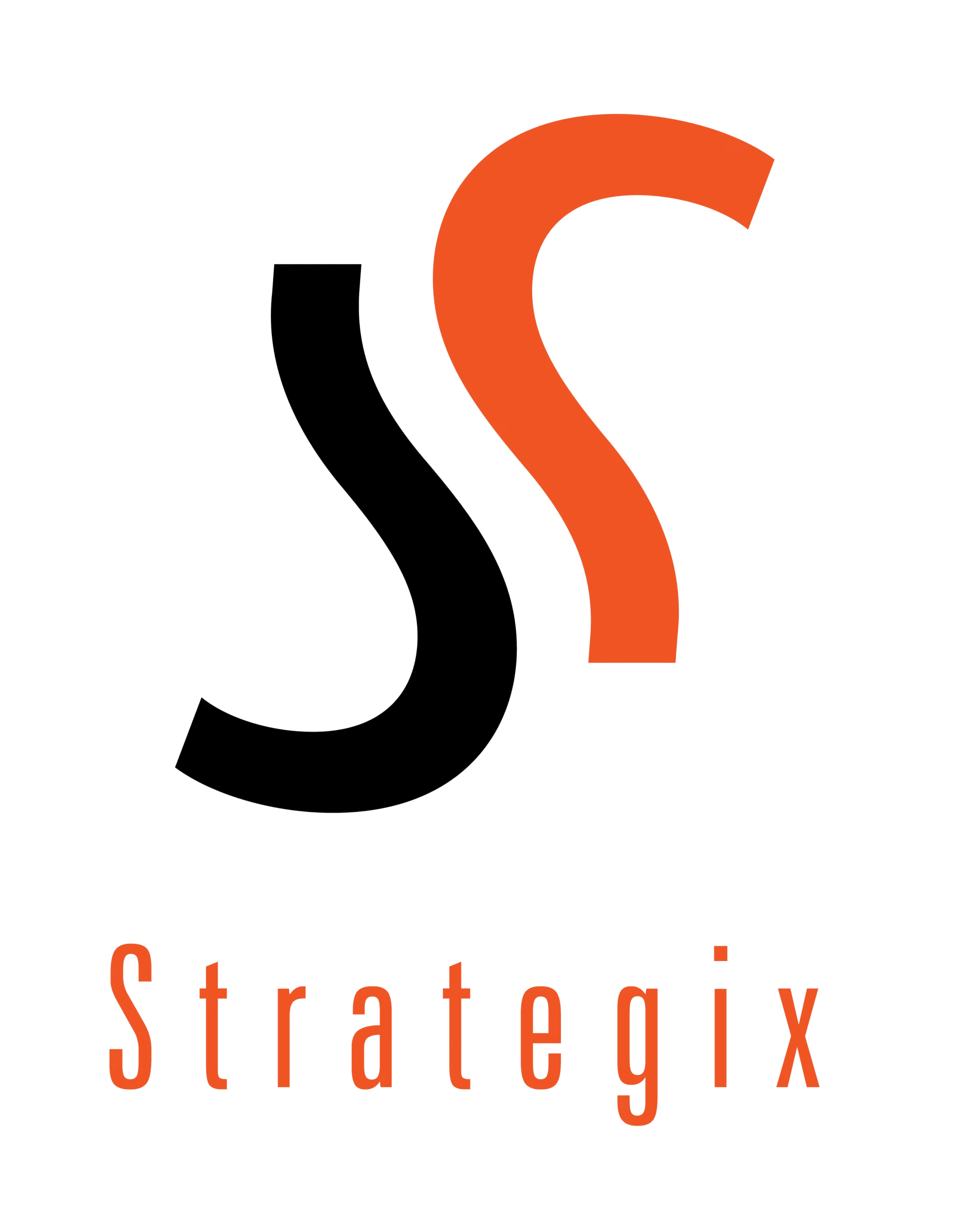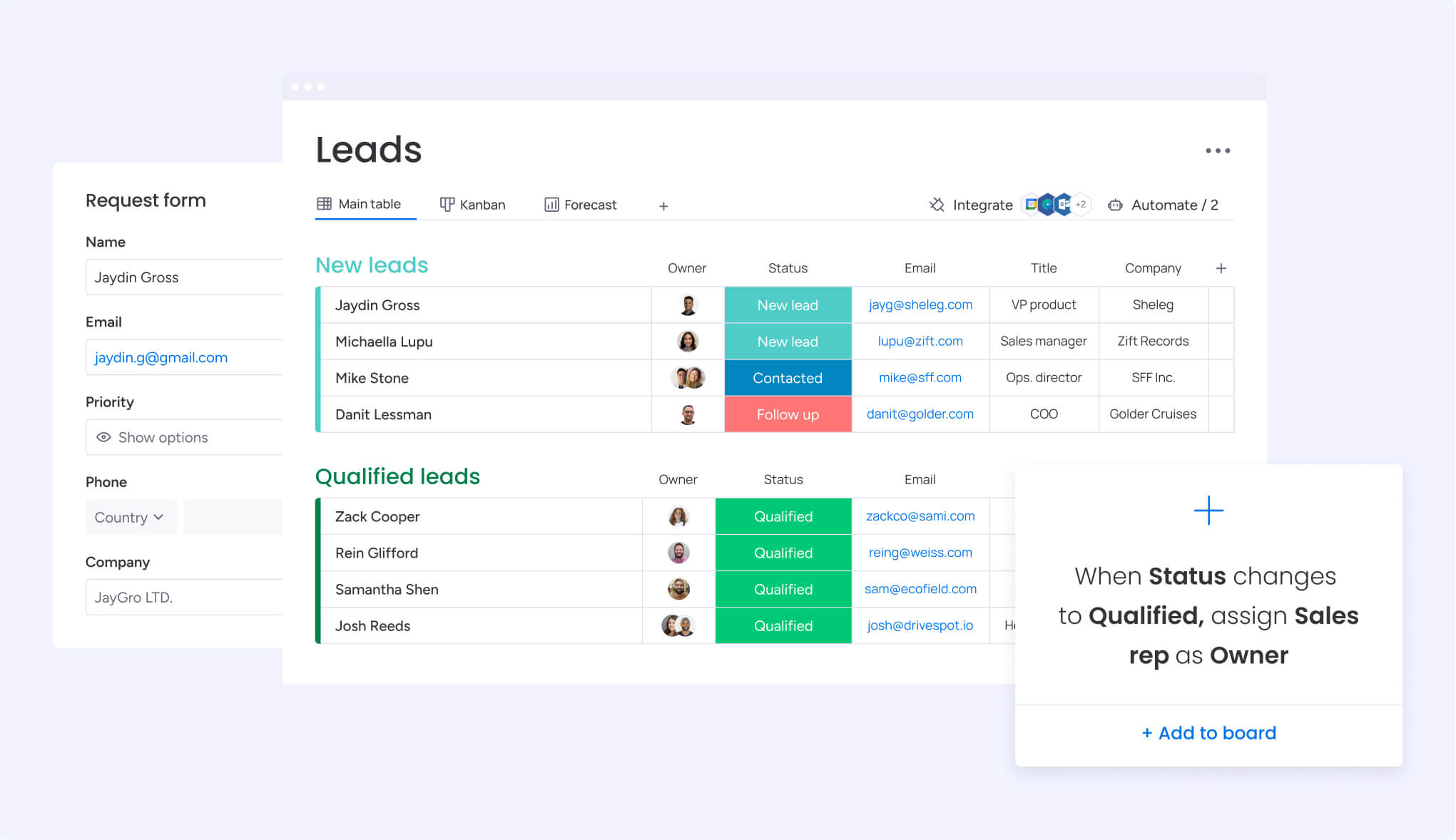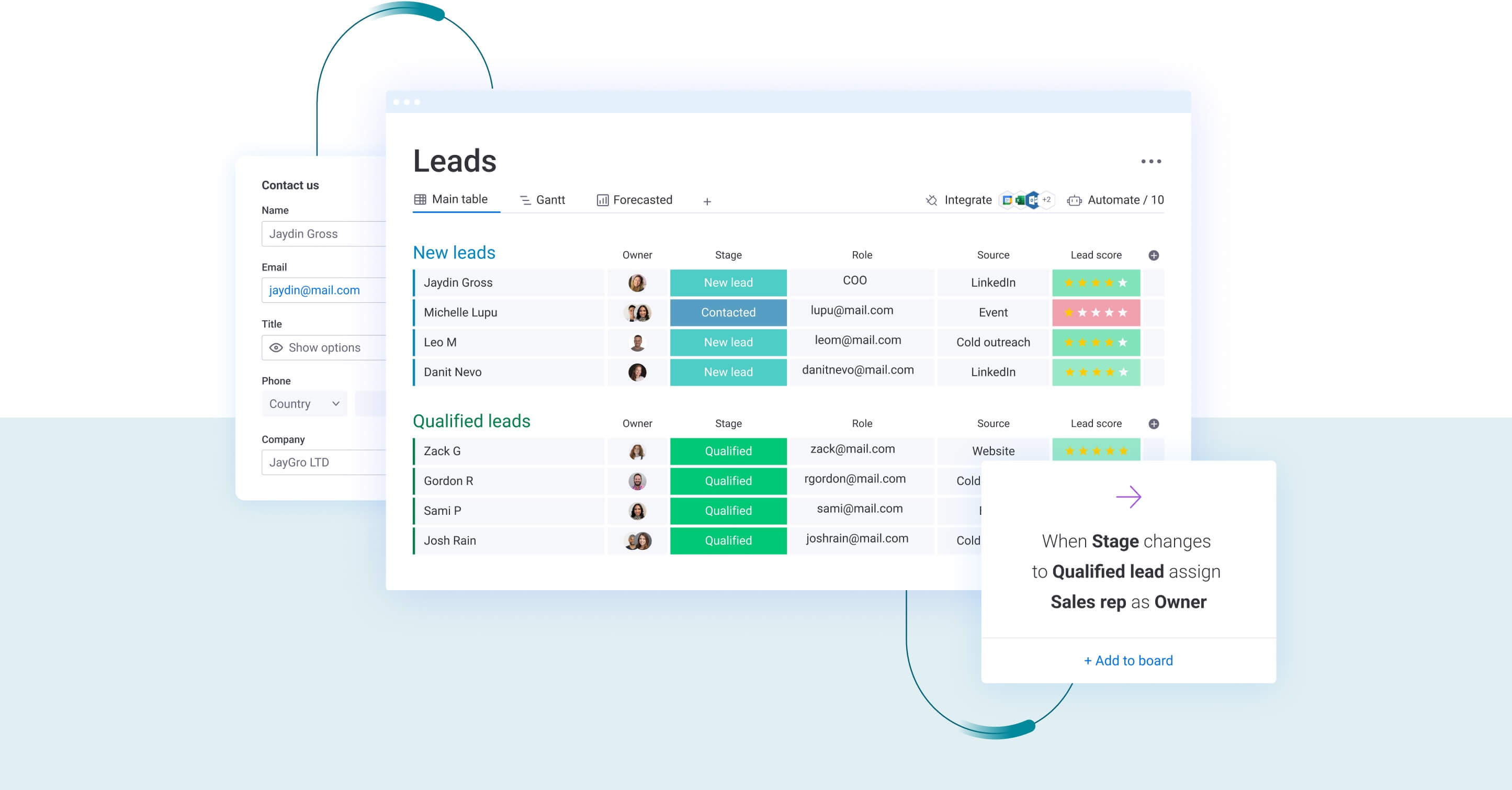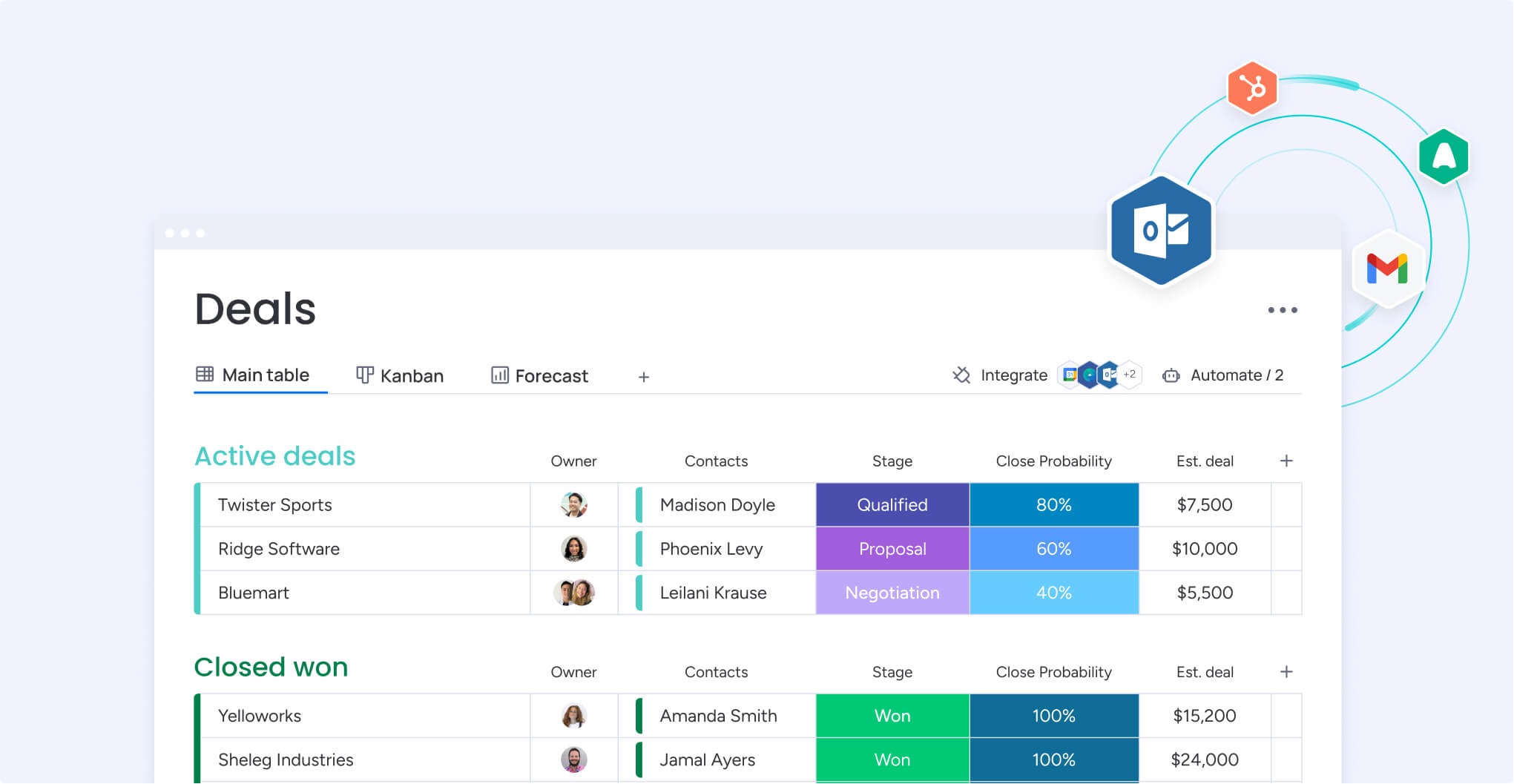Modern businesses thrive when their technology works in harmony. However, when customer data and website content live in isolated systems, the result is often disconnected workflows and missed opportunities to convert engagement into revenue.
Choosing between a CRM and a CMS can feel like a trick question because both promise to be the central nervous system for your operations. While one manages the customer universe and the other builds your digital storefront, they must eventually align to attract, engage, and convert customers effectively.
The following sections cut through the confusion by pinpointing when your business needs each system. By the end, you will understand how to integrate these tools to create a seamless, high-growth technology stack without the typical technical headaches.
Key takeaways
- Choose CRM when sales chaos costs you deals: if leads disappear, pipeline forecasting fails, or customer data lives in spreadsheets, prioritize CRM to stop revenue leakage immediately.
- CRM manages relationships, CMS manages content: CRM tracks customer interactions and sales processes while CMS creates and publishes website content, requiring different strategies and teams.
- Unified platforms eliminate the either-or decision: get flexible customer relationship management plus content workflow coordination in one platform like monday CRM, avoiding complex integrations and duplicate data entry that slow teams down.
- Implement CMS when content bottlenecks block growth: if website updates require developer tickets or your team can’t publish content fast enough, CMS removes those barriers to market presence.
- Integrated systems create powerful customer journey visibility: connect content engagement data with sales pipeline tracking to see which marketing efforts actually drive revenue, not just traffic.
What is a CRM system?
A CRM (Customer Relationship Management) system centralizes data and sales processes in one location, serving as the single source of truth for all information from initial contact through account management. Without one, interactions often scatter across spreadsheets and email inboxes, creating chaos.
Consequently, a CRM eliminates this friction by tracking every touchpoint automatically for the entire team.
Core CRM features and functions
CRM platforms deliver specific capabilities that help you manage customer relationships at scale while keeping interactions personal. These features tackle the fundamental challenge of staying organized as your customer base grows.
- Contact and lead management: your CRM maintains a centralized database with complete interaction history, contact details, and relationship context. Sales teams access unified customer profiles showing all communications, meetings, and deal progress in one view, without searching through multiple sources.
- Sales pipeline tracking: visual pipelines show exactly where each deal stands, from first contact to closed-won. You can spot bottlenecks instantly, forecast revenue accurately, and allocate resources to the opportunities most likely to close.
- Communication tools: every email, call, and meeting gets logged automatically. Sales reps document conversations, schedule follow-ups, and maintain communication continuity even when accounts transfer between team members.
- Sales forecasting and reporting: performance dashboards track conversion rates, deal velocity, and quota attainment in real time. You get visibility into sales operations without manual data compilation, helping leadership make informed decisions about hiring and growth investments.
CRM examples in action
Different CRM platforms serve different business needs, and understanding these distinctions helps you evaluate your options. Here are the most common platforms revenue teams consider:
- Salesforce: the cloud-based CRM leader for enterprise organizations requiring extensive customization.
- HubSpot: popular with mid-market companies focused on inbound marketing strategies.
- monday CRM: a flexible, intuitive alternative that adapts to any sales cycle without extensive technical setup.
Revenue teams using solutions like monday CRM find they can customize pipelines, automate workflows, and generate insights without waiting for IT support. The platform’s AI capabilities, like timeline summaries and email composition assistance, eliminate hours of manual work that bog down sales teams.
What is a CMS platform?
A CMS (Content Management System) enables you to create, edit, and publish digital content without coding knowledge. It separates content creation from technical implementation, so your marketing team can manage websites independently while maintaining design consistency.
Before CMS platforms existed, updating website content meant calling a developer for every small change. Now, your team can draft content, upload media, and publish pages through visual editors that show exactly how everything will look to visitors.
Essential CMS capabilities
CMS platforms empower teams to manage digital content efficiently without technical dependencies. These capabilities distinguish content management from customer relationship systems and enable marketing teams to move fast without developer bottlenecks:
- Content creation and editing: WYSIWYG editors let you format text, insert images, and structure pages visually. Template systems maintain brand consistency while giving creators flexibility to customize individual pages.
- Publishing workflows: content moves through editorial review before going live. You can schedule posts to publish automatically at optimal times for audience engagement.
- User permissions and SEO: role-based access controls define who can create, edit, and publish content. Built-in SEO tools help optimize content for search engines through meta descriptions, URL structures, and keyword integration, all without developer intervention.
- Template management: design templates ensure visual consistency across your entire website. When you need design updates, you can change templates without touching individual content pages.
Popular CMS examples
The CMS landscape offers options for every business size and technical capability. Understanding these options helps you choose the right platform for your content strategy:
- WordPress: powers over 40% of websites globally with extensive plugin ecosystems.
- Drupal: serves enterprise organizations requiring robust security and complex content structures.
- Wix/Squarespace: provides drag-and-drop simplicity for small businesses.
While CRM manages customer relationships and sales processes, CMS manages content creation and digital experiences. These represent distinct business functions that often work together in comprehensive digital strategies.
7 key differences between CRM and CMS
Knowing exactly what separates these systems helps you spend your budget wisely and avoid building a tech stack that works against your team. These platforms serve different purposes and require different approaches to implementation and optimization.
| Aspect | CRM systems | CMS platforms |
|---|---|---|
| Primary purpose | Customer relationship management and sales tracking | Content creation and website publishing |
| Data focus | Customer interactions, sales data, contact information | Web content, media files, digital assets |
| Target users | Sales teams, account managers, customer service | Content creators, marketers, web developers |
| Business outcomes | Revenue growth, customer retention, sales efficiency | Website traffic, content engagement, SEO rankings |
| Technical architecture | Customer database with sales workflows | Content repository with publishing tools |
| Automation focus | Sales processes, follow-ups, lead nurturing | Content publishing, editorial workflows |
| Scalability needs | Growing customer base and sales operations | Increasing content volume and website complexity |
1. Primary purpose and data focus
CRM systems exist to manage customer relationships throughout the entire lifecycle, while CMS platforms focus exclusively on creating and managing digital content. This fundamental difference determines all other system characteristics.
- CRM platforms: store customer interaction data including contact details, communication history, purchase behavior, creating a complete relationship record.
- CMS systems: manage content assets like articles, images, and page layouts, organizing digital materials for publication and distribution.
Because these data types differ so fundamentally, using one system for the other’s purpose often creates significant operational friction.
2. Target users and business outcomes
Sales teams rely on CRM daily to track deals and manage relationships, while marketing and content teams use CMS to publish website updates. Their needs differ dramatically: sales reps need pipeline visibility while content creators need editing tools.
- CRM success: shows up in sales metrics and customer retention rates, measuring relationship quality and revenue generation.
- CMS success: appears through website traffic and search rankings, tracking content engagement and digital presence.
As a result, organizations must measure these outcomes differently since they serve entirely different strategic purposes.
3. Technical architecture and automation
CRM systems are built around relational databases that connect customers to deals, while CMS platforms organize content hierarchically within repositories. These architectural differences reflect the distinct data structures each manages.
- CRM automation: handles lead assignment, follow-up reminders, and deal progression, streamlining sales processes and customer touchpoints.
- CMS automation: manages publishing schedules and editorial workflows, coordinating content creation and distribution timelines.
Furthermore, AI capabilities provided by platforms like monday CRM take this a step further. By automatically extracting information from emails and detecting customer sentiment, these tools eliminate the manual tasks that typically slow down sales teams.
4. Scalability needs
CRM and CMS platforms scale differently based on the distinct growth patterns they support. Therefore, understanding these differences is essential when planning long-term technology investments.
- CRM scalability: focuses on accommodating growing customer bases, expanding sales teams, and increasing transaction volumes without performance degradation.
- CMS scalability: centers on managing increasing content volume, supporting more concurrent editors, and handling higher website traffic loads.
Your growth trajectory determines which scalability characteristics matter most; revenue expansion demands CRM scalability, while market presence growth requires CMS scalability.

“With monday CRM, we’re finally able to adapt the platform to our needs — not the other way around. It gives us the flexibility to work smarter, cut costs, save time, and scale with confidence.”
Samuel Lobao | Contract Administrator & Special Projects, Strategix
“Now we have a lot less data, but it’s quality data. That change allows us to use AI confidently, without second-guessing the outputs.”
Elizabeth Gerbel | CEO
“Without monday CRM, we’d be chasing updates and fixing errors. Now we’re focused on growing the program — not just keeping up with it."
Quentin Williams | Head of Dropship, Freedom Furniture
“There’s probably about a 70% increase in efficiency in regards to the admin tasks that were removed and automated, which is a huge win for us.“
Kyle Dorman | Department Manager - Operations, Ray White
"monday CRM helps us make sure the right people have immediate visibility into the information they need so we're not wasting time."
Luca Pope | Global Client Solutions Manager at Black Mountain
“In a couple of weeks, all of the team members were using monday CRM fully. The automations and the many integrations, make monday CRM the best CRM in the market right now.”
Nuno Godinho | CIO at VelvSurprising similarities between CRM and CMS
Despite serving different purposes, CRM and CMS platforms share unexpected commonalities that explain why organizations often need both systems working together. These shared characteristics make integration more feasible and valuable than you might expect.
Cloud-based infrastructure
Both platforms operate in the cloud, eliminating on-premise server requirements. You access them from anywhere, get automatic updates, and benefit from built-in disaster recovery. This shared foundation makes integration more feasible than with legacy systems requiring complex server connections.
Furthermore, cloud architecture allows for similar subscription-based pricing models, enabling your team to scale usage up or down based on current needs without large upfront investments.
Collaboration and team features
Multiple users work together in both systems with different permission levels. Comment systems let team members discuss customer strategies in CRM or content drafts in CMS without leaving the platform.
Workflow approvals route deals through sales management review in CRM and content through editorial review in CMS. These parallel processes serve different purposes but follow similar collaboration patterns.
API and integration capabilities
Both platforms offer APIs and third-party integrations enabling data sharing between systems. Because of this, customer data from a CRM can inform content personalization in a CMS, while content engagement metrics from the website can feed directly back into customer profiles.
This integration focus reflects how both systems function as part of larger technology ecosystems. Advanced platforms like monday CRM exemplify this approach with native integrations to major platforms plus custom API options, ensuring your customer data flows seamlessly between all your business tools.
Top benefits of CRM for growing businesses
CRM systems deliver measurable outcomes that directly impact revenue growth and operational efficiency. These benefits become more pronounced as your customer base grows and sales processes become more complex. Here’s how they transform your business operations:
Enhanced customer retention rates
CRM platforms track interactions across the entire relationship lifecycle, identifying at-risk accounts before they churn. The system flags warning signs like decreased engagement or approaching renewal dates, triggering proactive outreach.
Key retention capabilities that make a difference:
- Proactive account management: automated alerts when customers show churn signals.
- Personalized experiences: complete interaction history for tailored communications.
- Systematic follow-up: automated reminders ensure no customer falls through cracks.
Accelerated sales cycles
Pipeline visibility and automated follow-ups help sales teams focus on high-value opportunities. Flexible solutions like monday CRM adapt to any sales cycle, providing instant automation through AI that eliminates manual data entry and repetitive tasks.
Your sales acceleration comes from:
- Visual pipeline management: see bottlenecks and allocate resources effectively.
- Automated lead scoring: focus energy on qualified prospects.
- Smooth handoffs: documented interactions enable seamless transitions between teams.
Predictable revenue growth
Sales forecasting tools analyze historical data and current pipeline to project future revenue accurately. Leadership makes informed decisions about hiring and investments based on reliable forecasts rather than guesswork.

Key benefits of CMS for digital success
CMS platforms improve content operations, search visibility, and marketing effectiveness through specific advantages that transform how you manage digital presence. These benefits compound as your content volume and marketing complexity increase.
Streamlined content operations
CMS centralizes content creation, enabling collaboration between writers, editors, and designers within unified workflows. Teams publish updates without developer intervention, accelerating time-to-market for campaigns.
Content efficiency gains include:
- Collaborative editing: multiple team members work simultaneously with version control.
- Template consistency: automatic brand compliance across all content.
- Publishing automation: schedule content batches for optimal timing.
Improved SEO and web performance
Built-in SEO tools optimize content through meta descriptions, URL structures, and technical features like XML sitemaps. CMS platforms also enhance site speed through caching and image compression, improving both user experience and search rankings.
Consistent multi-channel experiences
CMS maintains brand consistency across websites, landing pages, and content portals. Content reuse capabilities let you publish once and distribute across multiple channels, while centralized asset management ensures everyone uses current brand materials.

“With monday CRM, we’re finally able to adapt the platform to our needs — not the other way around. It gives us the flexibility to work smarter, cut costs, save time, and scale with confidence.”
Samuel Lobao | Contract Administrator & Special Projects, Strategix
“Now we have a lot less data, but it’s quality data. That change allows us to use AI confidently, without second-guessing the outputs.”
Elizabeth Gerbel | CEO
“Without monday CRM, we’d be chasing updates and fixing errors. Now we’re focused on growing the program — not just keeping up with it."
Quentin Williams | Head of Dropship, Freedom Furniture
“There’s probably about a 70% increase in efficiency in regards to the admin tasks that were removed and automated, which is a huge win for us.“
Kyle Dorman | Department Manager - Operations, Ray White
"monday CRM helps us make sure the right people have immediate visibility into the information they need so we're not wasting time."
Luca Pope | Global Client Solutions Manager at Black Mountain
“In a couple of weeks, all of the team members were using monday CRM fully. The automations and the many integrations, make monday CRM the best CRM in the market right now.”
Nuno Godinho | CIO at VelvWhen to use CRM vs CMS solutions?
Specific business scenarios indicate whether you need CRM, CMS, or both systems. Understanding these triggers helps prioritize technology investments and avoid implementing the wrong solution first. Let’s examine the key indicators for each platform:
CRM implementation scenarios
You should prioritize CRM when facing these challenges:
- Lost leads and poor follow-up: when opportunities disappear between initial contact and closing.
- Unpredictable sales pipeline: when you can’t confidently forecast next quarter’s revenue.
- Manual data entry overload: when your team spends more time updating spreadsheets than selling.
- Scattered customer information: when finding customer history requires checking multiple systems.
Modern platforms like monday CRM address these scenarios through centralized data, automated workflows, and AI-powered insights that give you complete visibility into every customer relationship.
CMS implementation scenarios
You should prioritize CMS when experiencing these needs:
- Frequent website updates: when content changes require developer tickets and long wait times.
- Multiple content creators: when your team needs collaborative editing and approval workflows.
- SEO-driven growth strategy: when organic search traffic drives your customer acquisition.
- Inconsistent brand presence: when different teams publish content that doesn’t match guidelines.
Signs you need both systems
Certain conditions indicate both CRM and CMS deliver maximum value:
- Disconnected sales and marketing: when teams work in isolation without shared visibility.
- Lead capture to close gaps: when website visitors don’t flow smoothly into sales pipeline.
- Customer journey tracking challenges: when you can’t connect content engagement to sales outcomes.
- Scaling operations: when growth demands both sales efficiency and content capacity.
Organizations using solutions like monday CRM often discover its flexibility bridges traditional boundaries, providing customer relationship management while coordinating content workflows through the same platform.
How CRM and CMS work together?
Integrated systems create powerful synergies that improve both customer relationships and content effectiveness. Strategic integration connects customer data with content strategy for personalized experiences that drive better business outcomes.
1. Integration strategies and best practices
API connections synchronize customer data between platforms in real time. Lead information from CMS website forms automatically creates CRM records, eliminating duplicate entry while ensuring immediate sales notification.
Moreover, customer insights from CRM inform content personalization in CMS. When sales reps update customer details, those changes reflect in personalization rules. This bidirectional flow keeps both systems current without manual exports.
2. Seamless data flows
Practical integration creates value through connected workflows. Here’s how data flows between systems:
- Lead capture: website form submission creates CRM record with all form data.
- Engagement tracking: content interactions enrich customer profiles in CRM.
- Sales enablement: relevant content appears directly within CRM workflows.
- Performance measurement: content effectiveness tracked through actual pipeline contribution.
3. Combined ROI
Integrated systems provide complete customer journey visibility from initial content engagement through sales conversion. Marketing teams measure content effectiveness through revenue impact tracked in CRM, while sales teams access relevant content without leaving their workspace.
Integration capabilities provided by solutions like monday CRM connect customer data with content strategies through AI-powered automation, enabling workflows that span traditional system boundaries without complex IT projects.
Choosing between CRM and CMS for your business
Practical decision frameworks help you evaluate immediate needs and prioritize investments. Making the right choice requires understanding your current challenges, available resources, and long-term business goals. Let’s examine how to make the right choice for your situation:
Step 1: evaluate your current needs
Firstly, document your specific operational pain points to reveal which platform addresses urgent requirements:
Current challenges assessment:
- Customer management issues: lost leads, poor pipeline visibility, inconsistent follow-up.
- Content management problems: slow publishing, inconsistent branding, poor SEO.
- Team capabilities: technical resources available for implementation.
- Business priorities: revenue growth versus market presence goals.
Step 2: conduct budget and resource assessment
Once needs are identified, remember that total cost extends far beyond licensing to include implementation, training, and maintenance. Consider these factors:
- CRM implementation: typically two to eight weeks depending on complexity and data migration.
- CMS implementation: ranges one to twelve weeks based on content volume and design requirements.
- Long-term value: calculate three-year total cost including all services and support.
- Integration costs: factor in connecting systems if implementing both.
Unified platforms often provide superior value through their adaptable architecture that handles both customer relationships and content coordination, eliminating future integration expenses.
Step 3: future-proof your decision
Finally, ensure your selected systems can scale alongside your business. It is vital to evaluate whether a platform can support an increasing number of users and customers without performance lag or prohibitive price hikes.
Furthermore, prioritize flexible platforms built on adaptable foundations; these allow you to adjust workflows as your strategies evolve, ensuring you never outgrow your technology investment.
Why do unified platforms eliminate the CRM vs CMS debate?
Teams are ditching the siloed approach because they’re tired of jumping between systems just to get basic work done. This approach delivers specific benefits that justify reconsidering traditional architectures and moving beyond the either-or mentality.
Breaking down system silos
Unified platforms eliminate data disconnection between customer relationships and content strategies. Sales teams access content performance data while marketing understands pipeline dynamics. This visibility improves collaboration and decision-making.
Benefits of unified approaches:
- Reduced duplicate entry: single data source eliminates synchronization errors.
- Complete journey visibility: track customers from content engagement through renewal.
- Cross-functional collaboration: teams work in shared workspaces with common data.
- Consistent reporting: everyone references the same metrics and definitions.
Reducing total cost of ownership
Single vendor relationships simplify procurement, support, and contract management. You avoid hidden costs of data synchronization failures that create customer experience problems.
Unified platforms typically cost less over three years when accounting for integration development, maintenance, and productivity lost to context-switching between systems.
Achieving true digital transformation
Your entire company operates more efficiently when sales and marketing aren’t fighting separate system battles and can gain full visibility into each other’s work. Data-driven decisions improve with complete operational visibility, and strategic agility increases when you can rapidly adjust processes across all functions.
Unified platforms transcend traditional CRM boundaries through flexible architectures, handling customer relationships and content workflows without managing separate systems or maintaining complex integrations.

Making the right choice for your business
Stop thinking you have to choose between CRM and CMS — that’s yesterday’s problem. Understanding the distinct purposes, benefits, and integration possibilities of both platforms helps you build a technology stack that supports your entire customer journey: from initial content engagement through long-term relationship management.
CRM systems excel at managing customer relationships, tracking sales processes, and driving revenue growth. CMS platforms shine at content creation, website management, and digital marketing effectiveness. When integrated properly, they create powerful synergies that improve both customer experiences and business outcomes.
For organizations seeking maximum flexibility and integration, unified platforms like monday CRM offer compelling advantages. They eliminate the complexity of managing separate systems while providing the core capabilities of both CRM and content workflow management.
Ultimately, the key is matching technology to your specific challenges and growth goals, which may include a specialized CRM for publishers if you generate revenue through advertising or memberships. Whether choosing separate systems or a unified platform, prioritize solutions that adapt to your unique sales cycles rather than forcing your processes to fit rigid limitations.
The content in this article is provided for informational purposes only and, to the best of monday.com’s knowledge, the information provided in this article is accurate and up-to-date at the time of publication. That said, monday.com encourages readers to verify all information directly.
Frequently asked questions
Is Salesforce a CRM or CMS?
Salesforce is primarily a CRM platform designed for managing customer relationships and sales processes. While Salesforce offers some content capabilities through add-ons like Experience Cloud, it's not a traditional CMS built for website content creation and publishing.
Can one system replace both CRM and CMS?
Unified platforms like monday CRM can handle both customer relationship management and content workflow coordination, though specialized CMS features like advanced website theming may require dedicated tools. The best approach depends on your content complexity and customer management needs.
What's the difference between CRM and customer management systems?
CRM is a specific type of customer management system focusing on sales processes, lead tracking, and customer interactions. Customer management systems is a broader term including various tools for managing customer data like help desk software and customer portals.
Do startups need both CRM and CMS platforms?
Most startups benefit from starting with CRM to manage customer relationships and sales, then adding CMS capabilities as content needs grow. Unified platforms provide both capabilities without managing separate systems, which often makes sense for resource-constrained startups.
How long does CRM and CMS implementation take?
CRM implementation typically takes two to eight weeks depending on complexity and data migration needs. CMS implementation ranges from one to twelve weeks based on content volume and design requirements. Unified platforms often reduce overall implementation time by eliminating integration projects.
Which system should I implement first?
Implement CRM first if sales and customer management cause immediate revenue leakage or operational inefficiency. Choose CMS first if website and content creation block your market presence. Unified platforms let you implement both capabilities simultaneously without sequential constraints.




